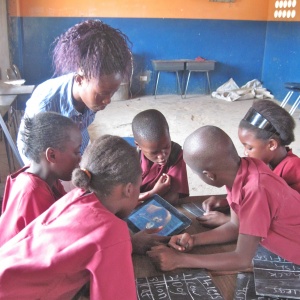OER4Schools/activities/Brainstorming: Difference between revisions
From OER in Education
JanetBlair (talk | contribs) (added description of the brainstorm technique) |
JanetBlair (talk | contribs) m (added /concept) |
||
| (3 intermediate revisions by 2 users not shown) | |||
| Line 1: | Line 1: | ||
This is a useful interactive teaching technique that allows all participants to make a contribution without fear of judgement from others. | <noinclude>{{OER4SchoolsRinfo | ||
}}</noinclude> | |||
This is a useful interactive teaching technique that allows all participants to make a contribution without fear of judgement from others. | |||
Here are the steps: | Here are the steps: | ||
# Students listen to a question posed by the teacher - | # Students listen to a question/idea/concept posed by the teacher - these should be open-ended with no specific right answers in order to generate a range of responses. | ||
# Students offer their ideas when the teacher asks them one by one - it is not necessary for students to raise their hands as everyone is encouraged to make a contribution | # Students offer their ideas when the teacher asks them one by one - it is not necessary for students to raise their hands as everyone is encouraged to make a contribution. | ||
# All ideas are recorded by the teacher where everyone can see them | # All ideas are recorded by the teacher where everyone can see them. | ||
After the brainstorm session the ideas can be further processed in line with the plan for the rest of the lesson. | After the brainstorm session the ideas can be further processed in line with the plan for the rest of the lesson. | ||
Latest revision as of 11:16, 15 February 2013
| Resource details | |
| Title | Brainstorming |
| Topic | |
| Teaching approach | |
| Learning Objectives | |
| Format / structure | |
| Subject | |
| Age of students / grade | |
| Table of contents | |
| Additional Resources/material needed | |
| Useful information | |
| Related ORBIT Wiki Resources | |
| Other (e.g. time frame) | |
| Files and resources to view and download | |
| Acknowledgement | This resource is part of the OER4Schools programme. |
| License | |
This is a useful interactive teaching technique that allows all participants to make a contribution without fear of judgement from others.
Here are the steps:
- Students listen to a question/idea/concept posed by the teacher - these should be open-ended with no specific right answers in order to generate a range of responses.
- Students offer their ideas when the teacher asks them one by one - it is not necessary for students to raise their hands as everyone is encouraged to make a contribution.
- All ideas are recorded by the teacher where everyone can see them.
After the brainstorm session the ideas can be further processed in line with the plan for the rest of the lesson.
Tips for using the technique successfully:
- establish a friendly, supportive, non-judgemental atmosphere for brainstorming
- remind students to listen to what other students have said to make sure that they don't repeat any replies
- try to keep the activity pacy, adapting the length of the brainstorm session to match the flow of ideas
- praise students for active listening and for respecting the contributions made by others
- the technique works well at the beginning of a new topic as a way of finding out students' prior knowledge

